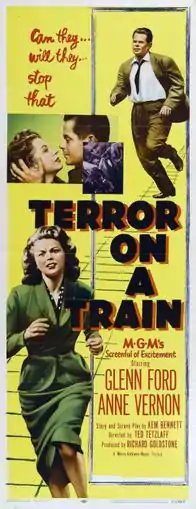Time Bomb (1953 film)
Time Bomb is a 1953 British-made MGM post-war thriller film directed by Ted Tetzlaff, written by Kem Bennett, and starring Glenn Ford and Anne Vernon.[2] In the United States it was released under the title Terror on a Train.[3]
| Time Bomb Terror on a Train | |
|---|---|
 | |
| Directed by | Ted Tetzlaff |
| Produced by | Richard Goldstone |
| Written by | Kem Bennett |
| Starring | Glenn Ford Anne Vernon Maurice Denham |
| Music by | John Addison |
| Cinematography | Freddie Young |
| Edited by | Frank Clarke Robert Watts |
Production company | MGM |
Release date |
|
Running time | 73 minutes (UK) 72 minutes (U.S.) |
| Country | United Kingdom |
| Language | English |
| Budget | $975,000[1] |
| Box office | $746,000[1] |
Plot
In Birmingham, Railway Police Constable Charles Baron (John Horsley) is involved in a confrontation with a man believed to be a local vagrant. The man gets away, but he is soon found out to have been a saboteur, who has left a suitcase full of detonators and bomb-making components at the railway yard. Police realize that the man was attempting to sabotage a trainload of sea mines, destined for the Royal Navy Yard at Portsmouth. The train is stopped as soon as possible in case an explosion is imminent, but a residential area is nearby and the police have to evacuate local residents.
The local authorities get in contact with former World War Two Royal Canadian Engineers bomb disposal Major Peter Lyncort (Glenn Ford), who is living in the city with his Parisian French wife Janine (Anne Vernon) and working for Anglo-Canadian Machine Tool Co., Ltd. Lyncort agrees to help, when the city's Railway Police security chief Jim Warrilow (Maurice Denham) visits. Janine Lyncort is not there, as she had walked out on him after their tenth fight in just one month.
Lyncort begins opening the trainload of mines one by one. They are hollow and a small explosive charge hidden inside any one could explode the whole train. The work is slow as well as dangerous, and Warilow joins in as Lyncort's assistant. They find an explosive charge and Lyncort disarms it.
Meanwhile, the police plan to catch the saboteur in Portsmouth, in case he goes there to see the fruits of his labours, like an arsonist who stays at the scene of his crime. Constable Baron drives to the railway station in Portsmouth. He recognizes the suspect (Victor Maddern), who is apprehended; they are flown by Royal Navy helicopter back to Birmingham, and taken to the stopped train. Lyncort tells him the bomb has been disarmed, but the saboteur becomes agitated and reveals that there is a second bomb, and it is due to go off at any moment, killing them all and devastating the neighbourhood. However, it has a chemical fuse, whose timing may be somewhat inaccurate.
Janine, meanwhile, remains unaware of all this. Coming home at 3 am to make up with Lyncort, she finds their home empty and starts making phone calls to all the local hospitals, fearing Lyncort has been involved in an accident. Eventually, Janine finds out where her husband is and arrives just in time to see him find the second bomb. He throws it away from the train and it explodes harmlessly in mid-air. They walk away, holding each other closely, as the movie ends.
Cast
- Glenn Ford as Major Peter Lyncort
- Anne Vernon as Janine Lyncort
- Maurice Denham as Jim Warilow
- Harcourt Williams as Vicar
- Victor Maddern as Saboteur
- Harold Warrender as Sir Evelyn Jordan
- John Horsley as Constable Charles Baron
- Campbell Singer as Inspector Brannon
- Bill Fraser as Constable J. Reed
- Herbert C. Walton as Old Charlie
- Martin Wyldeck as Sergeant Collins
- Arthur Hambling as Train Driver
- Harry Locke as Train Fireman
- Frank Atkinson as Guard
- Ernest Butcher as Martindale
- Sam Kydd as Ticket Inspector
Reception
According to MGM records the film earned $346,000 in the US and Canada and $400,000 elsewhere, resulting in a loss of $517,000.[1]
In their survey of British B movies, Steve Chibnall and Brian McFarlane describe Time Bomb as "a slickly made suspense thriller with a twist in the tail" that "pointed the direction for British second features over the next decade": "Its compact story, clear narrative trajectory, convincing location work and engaging central performance augmented with entertaining character studies, all provided a template for smaller British production outfits looking to give their films some international appeal."[4]
References
- The Eddie Mannix Ledger, Los Angeles: Margaret Herrick Library, Center for Motion Picture Study.
- "Time Bomb". BFI. Archived from the original on 12 July 2012.
- "Terror on a Train (1953) - Ted Tetzlaff - Synopsis, Characteristics, Moods, Themes and Related - AllMovie". AllMovie.
- Steve Chibnall & Brian McFarlane, The British 'B' Film, Palgrave Macmillan, London, 2009, p. 49.